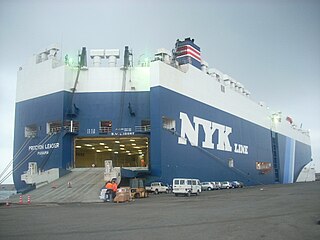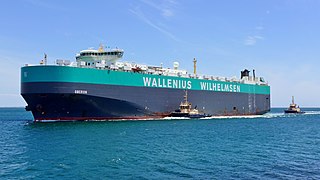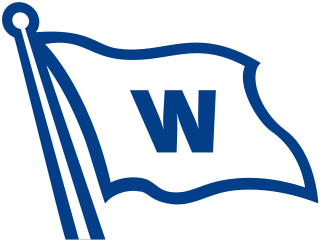
The United States Merchant Marine is an organization composed of United States civilian mariners and U.S. civilian and federally owned merchant vessels. Both the civilian mariners and the merchant vessels are managed by a combination of the government and private sectors, and engage in commerce or transportation of goods and services in and out of the navigable waters of the United States. The Merchant Marine primarily transports domestic and international cargo and passengers during peacetime, and operate and maintain deep-sea merchant ships, tugboats, towboats, ferries, dredges, excursion vessels, charter boats and other waterborne craft on the oceans, the Great Lakes, rivers, canals, harbors, and other waterways. In times of war, the Merchant Marine can be an auxiliary to the United States Navy, and can be called upon to deliver military personnel and materiel for the military.

Hyundai Glovis Co., Ltd. is a logistics company headquartered in Seoul, South Korea and part of the Hyundai Kia Automotive Group. Its predecessor company, Hankook Logitech Co. Ltd was formed in February 2001. Hyundai Glovis supplies ocean transportation logistics advice, cargo space, loading/unloading, and packaging services. It changed its name to Hyundai Glovis in June 2003.

A cargo ship or freighter is a merchant ship that carries cargo, goods, and materials from one port to another. Thousands of cargo carriers ply the world's seas and oceans each year, handling the bulk of international trade. Cargo ships are usually specially designed for the task, often being equipped with cranes and other mechanisms to load and unload, and come in all sizes. Today, they are almost always built of welded steel, and with some exceptions generally have a life expectancy of 25 to 30 years before being scrapped.

The United States Maritime Administration (MARAD) is an agency of the United States Department of Transportation. MARAD administers financial programs to develop, promote, and operate the U.S. Maritime Service and the U.S. Merchant Marine. In addition, it conducts research and development activities in the maritime field; regulates the transfer of U.S. documented vessels to foreign registries; maintains equipment, shipyard facilities, and reserve fleets of Government-owned ships essential for national defense.
Its programs promote the use of waterborne transportation and its seamless integration with other segments of the transportation system, and the viability of the U.S. merchant marine. The Maritime Administration works in many areas involving ships and shipping, shipbuilding, port operations, vessel operations, national security, environment, and safety. The Maritime Administration is also charged with maintaining the health of the merchant marine, since commercial mariners, vessels, and intermodal facilities are vital for supporting national security, and so the agency provides support and information for current mariners, extensive support for educating future mariners, and programs to educate America's young people about the vital role the maritime industry plays in the lives of all Americans.

Roll-on/roll-off ships are cargo ships designed to carry wheeled cargo, such as cars, motorcycles, trucks, semi-trailer trucks, buses, trailers, and railroad cars, that are driven on and off the ship on their own wheels or using a platform vehicle, such as a self-propelled modular transporter. This is in contrast to lift-on/lift-off (LoLo) vessels, which use a crane to load and unload cargo.

Wallenius Lines is a privately owned Swedish shipping company. The company was founded in 1934 by Olof Wallenius. Wallenius Lines is an investor and active owner within the global shipping industry, specifically the international car and roll-on/roll-off segment.

Wallenius Wilhelmsen Logistics was a privately owned Norwegian/Swedish shipping company, established in 1999 and co-owned by the two shipping companies Wallenius Lines and Wilh. Wilhelmsen.

Wallenius Wilhelmsen is a Sweden/Norway-based global RoRo shipping and vehicle logistics company, managing the distribution of cars, trucks, rolling equipment, Mafi trailers and breakbulk globally.

Wilh. Wilhelmsen Holding ASA (WWH) is a Norwegian multinational maritime group, headquartered in Lysaker, Norway. The group employs more than 21,000 people and has operations in 75 nations. The Wilhelmsen group operates the largest maritime network in the world, with over 2200 locations worldwide.

USNS Comet (T-AK-269), later T-LSV-7, later T-AKR-7, later SS Comet, is a vehicle landing ship built for the United States Navy. The lone ship of her class, she is named for the comet, and is the fourth U.S. Naval vessel to bear the name.
In the ocean shipping trade, neo-bulk cargo is a type of cargo that is a subcategory of general / break-bulk cargo, that exists alongside the other main categories of bulk cargo and containerized cargo. Gerhardt Muller, erstwhile professor at the United States Merchant Marine Academy and Manager of Regional Intermodal Planning of the Port Authority of New York and New Jersey, promotes it from a subcategory to being a third main category of cargo in its own right, alongside containerized and bulk cargo.

Leif Höegh & Co is a shipping company founded in 1927 by Norwegian Leif Høegh (1896-1974). Since 2006 the company has been structured as two separate entities, Höegh Autoliners and Höegh LNG, with Leif Höegh & Co acting as a common holding company.

MV Cape Victory (T-AKR-9701) was built in 1984 as MV Marzario Britainna by Cant Nav. Italiani. After launching, it was delivered to CMB T. Italy for commercial operation. She was acquired. 2 April 1993, by the United States Department of Transportation, Maritime Administration and renamed MV Cape Victory on 2 April 1994 and assigned to the Maritime Administration's Ready Reserve Force, 19 August 1994. When activated Cape Victory is one of the Maritime Administration's 31 Roll-on/Roll-off Reserve Force Ships assigned to the US Navy's Military Sealift Command (MSC) Sealift Program Office. Cape Victory is nested at the National Defense Reserve Fleet in Beaumont, Texas, in ROS-5 status, with a 10-man maintenance crew on board.
The Type C7 ship(Lancer Class) is a United States Maritime Administration (MARAD) designation for a cargo ship and the first US purpose-built container ship. The vessels were constructed in US shipyards and entered service starting in 1968. As US-built ships they were Jones Act qualified for shipments between US domestic ports. Under the Jones Act, domestic US maritime trade is restricted to US-built and flagged vessels of US owners and manned by predominantly US-citizen crews. The last active Lancer container-configured ship was scrapped in 2019. Lancers of the vehicle Roll-on/Roll-off (RO/RO) configuration remain held in the Ready Reserve Force, National Defense Reserve Fleet and the US Navy Military Sealift Command. All are steam powered.

MV Cape Trinity (T-AKR-9711) is a Roll-on/Roll-off (RO/RO) ship with the Ready Reserve Force (RRF) of the United States Department of Transportation's Maritime Administration (MARAD). As of 31 December 2014, the homeport of this motor vessel (MV) is the Port of Houston in Houston, Texas, and she is on ROS-5 status; she is able to be fully operational within 5 days of being activated. When activated, she becomes part of the United States Navy's Military Sealift Command (MSC).

United European Car Carriers (UECC) is a Norwegian roll-on/roll-off shipping line, created in 1990 and based in Oslo, Norway. The company primarily transports cargo on short sea routes within Europe.

EUKOR is a specialised Roll-on/roll-off shipping line formed in 2002. The company's main business is the sea carriage of new and used cars and High & Heavy cargo.

Toyofuji Shipping Co is a roll-on/roll-off shipping company based in Nagoya, Japan and owned by Toyota Group. It has a subsidiary branch in Europe for short sea operations within the region, located in Belgium.

K Line European Sea Highway Services GmbH (KESS) is a roll-on/roll-off shipping line based in Bremen, Germany and is a subsidiary of the Japanese shipping line K Line.

























